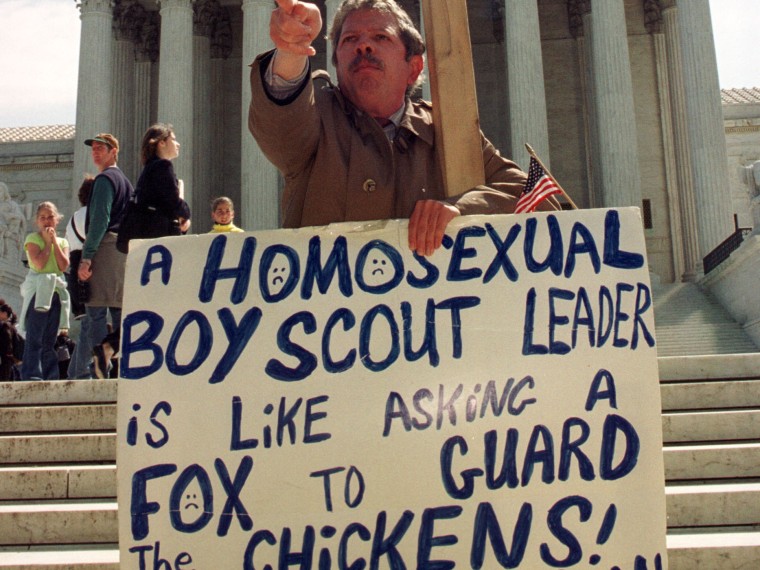The Boy Scouts of America may be changing its policy of discrimination based on sexual orientation.
In a controversial resolution released on Friday, the group proposed lifting its ban on gay scouts--a significant shift in policy for one of the nation’s largest and most prominent youth development institutions--while still maintaining its current position excluding gay adults as potential leaders. If approved, the policy would take effect on Jan. 1, 2014.
“No youth may be denied membership in the Boy Scouts of America on the basis of sexual orientation or preference alone,” read the proposal released on Friday by the Boy Scouts of America, whose roughly 1,400 National Council members plan to vote on the change at a meeting next month. But as for its adult leadership standards, the organization will “not grant membership to individuals who are open or avowed homosexuals, or who engage in behavior that would become a distraction to the mission of the BSA.”
The Scouts’ policy shift, which aims to strike a middle ground between positions held by gay rights advocates and those of its more conservative sponsors, immediately drew fire from LGBT advocates, who argued that the proposal did not go far enough.
"Until every parent and young person have the same opportunity to serve, the Boy Scouts will continue to see a decline in both membership and donations," said Rich Ferraro, a spokesman for the gay-rights watchdog group GLAAD.
Chad Griffin, president of the Human Rights Campaign, voiced similar disappointment: "What message does this resolution send to the gay Eagle Scout who, as an adult, wants to continue a lifetime of Scouting by becoming a troop leader?" he said.
On the other side, the Scouts’ proposal of inclusion (however incomplete) could run the risk of alienating its conservative supporters, such as the Mormon Church and the Roman Catholic Church, which together sponsor groups enrolling about one-fourth of all scouts. LDS spokesman Michael Purdy did not offer an immediate reaction to the proposed resolution, but said only in a statement that Mormon leaders would “take the time needed to fully review the language and study the implications of this new proposal.” The National Catholic Committee on Scouting, which acts as an adviser to the Boy Scouts of America, declined to comment at this time.
The logic behind a policy that welcomes gay youths but not gay adults remains unclear, but OnMyHonor.Net--an organization that describes itself as a coalition of concerned BSA parents, Scoutmasters, Eagle Scouts and other Scouting leaders--offers a glimpse into the distrust of openly gay adults among the scouting community. Its website lists "overt gay political activism," and "open, public and inappropriate expressions of physical affection between homosexual boy scouts and adult gay scout leaders," as some of its concerns.
Other opponents find the policy's double standard on openly gay people too confusing. Tony Perkins, president of the Family Research Council, called the policy "incoherent," in that it says, "in essence, that homosexuality is morally acceptable until a boy turns 18–then, when he comes of age, he's removed from the Scouts."
Deron Smith, spokesman for the BSA, could not be reached to explain the group's reasoning behind treating gay youths differently from gay adults. But on Friday, the Boy Scouts did say their change in course was partially related to the findings of a February survey sent out to about one million members of the scouting community. What they found was that a majority of adults involved in scouting supported the past policy of excluding gay people, but that a majority of younger parents and teenagers opposed it. The study summary also said that many adults expressed particular concern about child safety and whether gay men were appropriate role models, The New York Times reports.
The Boy Scouts’ policy of discrimination toward gay people took center stage last year when Jennifer Tyrrell, a lesbian parent in Ohio, was dismissed as her 7-year-old son’s den leader. Since then, the issue of gay rights has taken an increasingly prominent place in the national dialogue. There are two same-sex marriage cases awaiting rulings from the Supreme Court. And a recent NBC News/Wall Street Journal poll found that the country was shifting toward embracing tolerance, with more Americans in favor of same-sex marriage, and more Americans making the assumption that people are born gay rather than choosing to be gay.
But for now, it looks like Tyrrell will have to wait for the Boy Scouts to catch up to public opinion. “One year after sending a letter ousting me as my son’s leader, the Boy Scouts are once again forcing me to look my children in the eyes and tell them that our family isn’t good enough,” she said in a statement.
